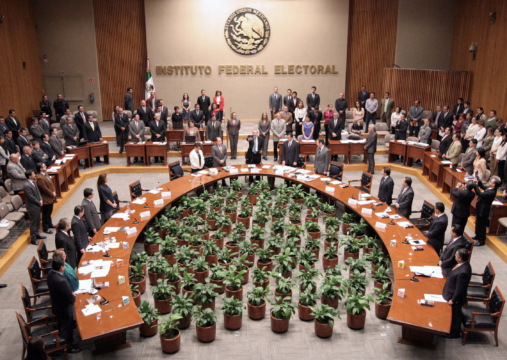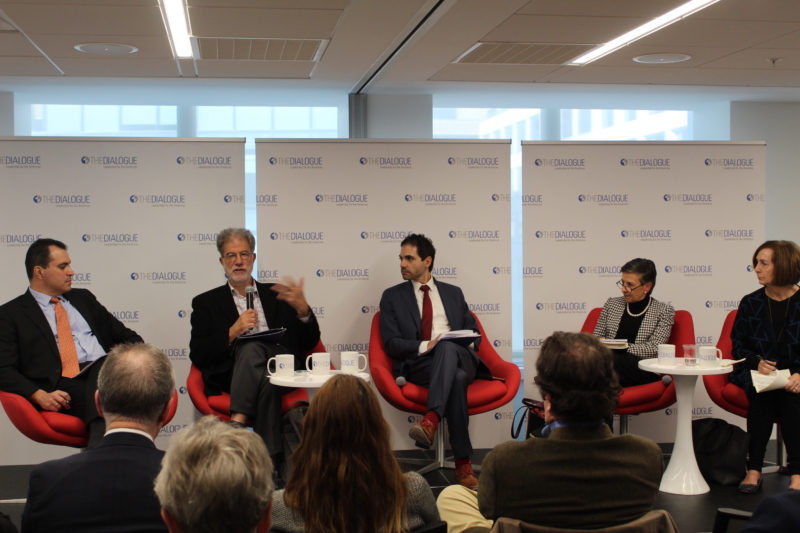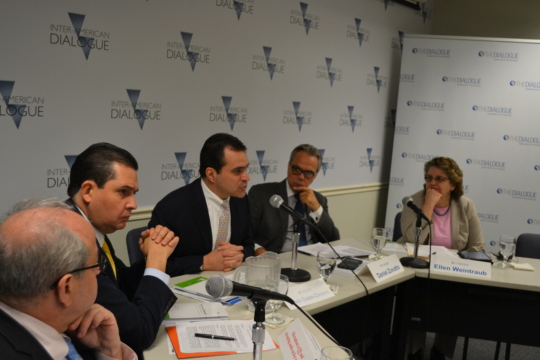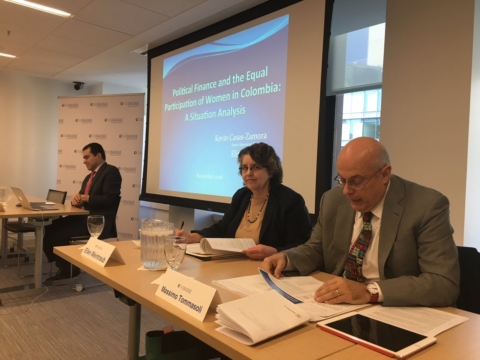
The Crucial Independence of Supervisory Bodies
One of the most complex challenges in political financing regulation is to ensure the effective application of controls.
On March 5, 2019, the Inter American Dialogue hosted an event titled “Political Finance and State Capture in the Americas.” The panel was the second in a joint Inter-American Development Bank (IDB) / Inter-American Dialogue Anti-Corruption, Transparency and Integrity in the Americas Symposia series that convenes leading anticorruption, transparency and integrity experts to identify targeted solutions to these issues in Latin America and the Caribbean. The discussion featured opening remarks by Roberto de Michele of the IDB, followed by a panel discussion featuring Ann M. Ravel, former Commissioner of the US Federal Election Commission; Eduardo Engel, Professor of Economics at the Universidad de Chile and former President of Espacio Publico; Delia Ferreira, President of Transparency International; and Kevin Casas-Zamora, Senior Fellow at the Inter-American Dialogue and former Vice President of Costa Rica. The discussion was moderated by Michael Camilleri, director of the Peter D. Bell Rule of Law Program at the Inter-American Dialogue.
De Michele opened the panel by emphasizing that corrupt political finance serves to forward the interests of the wealthy and powerful and reify social inequalities, thereby eroding citizen trust in government, which is problematic. The greatest manifestation of such an erosion, stated Ferreira, was the Corruptions Perceptions Index (CPI) for Latin America, which has shown no improvement since 2012. Over the past decade, grand corruption -- when political officials use their office for venal personal gain -- has become the new normal. Political money is no longer private money -- politicians now enrich themselves by skimming money from the public purse. Over-valuation of public contracts is one primary source of this personal enrichment. Private companies don’t pay bribes directly, but rather they money launder the extra costs of contracts to legitimize money going into public funds and subsequently the pockets of public officials. Problematically, this kind of grand corruption is pursued not by electoral tribunals, but by outside judicial processes -- there is not a strong enough punitive or regulatory mechanism within the executive or legislative branch that can prevent or mitigate this corruption. Another problem that intertwines corruption and political finance is the influence of criminal networks on national and local politics. In the last 20 years, criminal networks stopped financing national politics and focused on local and subregional politics, where politicians can more easily be coerced or paid off more cheaply and with less oversight. Some potential solutions, additional to the investigations and prosecutions already taking place, is making sure that private sector individuals that facilitate public corruption also face sanctions, not just public authorities. Furthermore, the swell of civil society indignation and protest is a new element that should be taken advantage of to push for greater accountability.
Engel summarized some of the more surprising findings from the Odebrecht scandal: namely, that the bribes were relatively small, and they did not significantly increased Odebrecht’s profits. They were merely a means to make an already competitive construction company, that could have feasibly won contracts without bribing, even more competitive. Odebrecht was incredibly efficient in giving bribes: they had a specific bribe-management arm called the Division of Structured Operations, which held a bank subsidiary in Antigua and ensured no leakage of bribes and security for bribe recipients. After the creation of the Division, Odebrecht’s business multiplied tenfold, but it’s profits remained the same. Engel called for a more efficient and transparent political financing mechanism as well as increased vigilance in contract followup: many companies make sure to follow the rules during the bidding process but then stray from or manipulate the terms of the contract once they have obtained it.
Casas-Zamora made a point to distinguish political donations and bribes. Bribes, he said, show that political donations have little purchasing power--political financing is less relevant in more corrupt countries. Furthermore, although Latin America has been a pioneer in public funding, with the first public political fund set up in Uruguay in 1928, there is a significant gap between normative frameworks and actual practice. Nevertheless, hearteningly, political finance has become more relevant in Latin America because there are more competitive elections and there has been a good deal of democratic consolidation: whereas safe, free and fair elections are more “basic democratic” concerns, political finance reform is an “advanced democratic” issue, and is only addressed once countries have achieved the former. In fact, the recent string of corruption scandals in the region, many of which have a campaign finance element, is indicative of an increase in transparency levels in the region. However, local level political financing is the weakest link in the chain, as alluded to by Ferreira. In a CICIG 2015 report, 75% of funding for political parties in Guatemala came from organized crime of illicit schemes connected to public works. To attempt to counter corrupt campaign financing, some countries, such as Costa Rica, have banned corporate donations, while others, such as Chile and Mexico, have introduced strict electoral sanction systems where an election can even be overturned if there are sufficient violations. However, as mentioned by Ferreira and Engel, there needs to be a holistic approach to campaign finance regulations, where safeguards are incorporated into the political finance infrastructure. As it stands, political finance violations are discovered by tax and judicial authorities. The capacities of electoral authorities need to be strengthened, focusing on the local level and enlisting the aid of civil society, which in many cases has already or is developing new apps and methods to facilitate reporting of donations and income for public officials.
Anne Ravel citando a Stiglitz “no se puede resolver la cuestion de la desigualdad económica sin reformar la financiación de la politica” https://t.co/rSS2KRTfrU@BID_GobernArte @DeliaFerreira@camillerimj @SheilaGrandio
— Roberto de Michele (@rodemichele61) 5 de marzo de 2019
Ravel spoke about how the US Federal Election Commission is captured by private and special interests; many Commissioners came with the clear agenda of undermining the Commission’s mandate, for example, Don McGahn, who was a Commissioner from 2008-2013 and is now White House Counsel. The Federal Election Commission is structured in such a way as to create stalemate: four votes out of the six are required to take any action at all, even open an investigation, and with three Democratic and three Republican Commissioners, the decision by all Republicans to vote as a bloc and block any enforcement action--even when the General Counsel recommends an investigation--makes the FEC totally defunct. Furthermore, electoral improprieties have to be brought to the FEC by activists or outside groups, as it does not have the resources to identify them itself. She stated that “dark money”--that is, where the source is occluded--is only dark to the American people: the people receiving the money know who is paying them and what agendas they need to push.
After the panel, there was a Q&A section in which one asked about whether over-regulation of campaign financing can lead to more corruption and illicit activity as actors simply evade the rules rather than change their behavior. Casas-Zamora answered that, while the least regulated countries in terms of campaign finance are the Nordic countries--some of the least corrupt in the world--Latin America is not Sweden. Guatemala, for example, is a libertarian paradise, with egregiously low taxes and virtually no state presence outside urban centers, and it is vastly corrupt. A good mix of regulation and normative change is therefore necessary.
One of the most complex challenges in political financing regulation is to ensure the effective application of controls.
Political finance may not get headlines, but it is the backbone of clean and fair elections
Despite taking significant steps towards a more gender-balanced political system –notably the recent adoption of female representation quotas— Colombia, like many other Latin American countries, continues to struggle with the legacies of pervasive social, economic and political inequality that disproportionately affect women. The study gauges the effect that campaign finance has for aspiring female leaders, and puts it in the context of broader social and cultural barriers that hinder women’s political activism throughout the region.
 Leonie Rauls / Inter-American Dialogue
Leonie Rauls / Inter-American Dialogue
 Video
Video
